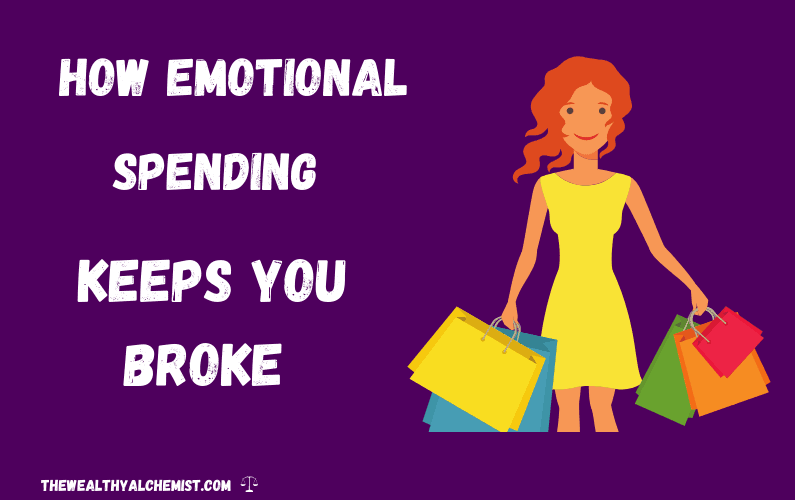
Emotional spending is a dangerous thing. Imagine this, driving while angry or sad can increase your chances of crashing 10x. This is according to a Virginia Tech study.
Now imagine what you’ll do to your finances if you spend
Scary, right?
We all believe that we behave rationally with our money. But the truth is that money mixed with emotion creates the perfect storm that can decimate your finances.
And that, my friends, is the purpose of this article. To discuss the emotions that sway each of us to make the purchases we do.
By making ourselves aware of the effects of our emotions, we stand a good chance of protecting our finances from our own impulses to engage in emotional spending.
But while it’s best to make financial decisions rationally rather than emotionally, it’s impossible to think clearly when we are under the power of our biological systems.
These systems make us act, react, and pursue certain things often without any thought or judgment on our part.
Even the most rational mind can fall prey to these systems. It doesn’t matter who you are, what your IQ is, the number of degrees you have or the friends you keep.
Your finances can and will fall prey to your emotions.
But why?
Well, we succumb to emotional spending for internal and external reasons.
Related Post: Tips for developing a Wealthy Mindset.
Internal Reasons
We all engage in emotional spending for our own personal, internal reasons. Our memories and experiences play an important role in influencing our buying decisions.
We may have a conscious or subconscious impulse to buy something that reminds us of the pleasurable experiences we had when we were younger.
For example, you may decide to buy a house simply because it reminds you of your grandparent’s house and brings back memories of your childhood summers.
Or maybe you choose to collect action figures, posters, or whatever in an attempt to recapture your past.
Either way, buying decisions are often influenced by memories, desires, and experiences that put us into a specific emotional state.
External Reasons
The second reason we succumb to emotional spending is external.
Marketers, for example, constitute an external reason. They have done their homework and have mastered well the skill of influencing our decisions.
Well-designed persuasive techniques and powerful emotional messages are the keys to this factor.
Many times we’re not even aware of the persuasive techniques at play when we make a purchase.
Or maybe you don’t need a marketer to whisper suggestions in your ear. For many of us, our desire to fit in with peers, friends, and neighbors provide plenty of influence over our purchase decisions.
Altogether, there are plenty of internal and external reasons we engage in emotional spending. Nostalgia, marketing, and peer pressure are just a few.
Now that we’ve discussed the source of emotional spending, let’s talk about the specific types of emotions that drive our behavior with money.
Emotional factors that drive our money behavior
1) Fear
Fear generally manifests itself as a self-imposed limitation on your lifestyle. You may be afraid of leaving your family impoverished if something happens to you. So you save and save and save.
You may worry about your job security and the job market. Or you may be afraid of not being able to retire on time, if ever.
This fear often creates a situation where our spending is at a minimum and our level of saving is at a maximum. All the pleasures of life are extremely constricted, people become cautious and miserly. Their first choice is to deprive themselves even of the things they need.
You May Also be interested in: How to Become a Smart Spender.
2) Self- Worth
At certain times in our lives, we all question our own self-worth. And this can affect how we spend our money.
If you don’t feel good about yourself you may use money as a way of self-validation. And this can be like trying to fill a black hole with your hard-earned money.
3) Sadness
This emotion also causes us to overspend. It compels us to make self-gratifying purchases in order to relieve our negative emotions.
All of us can identify purchases that make us feel good. These are the items we crave when we’re trying to suppress negative feelings.
4) Jealousy
Jealousy manifests itself in your financial life as a sort of competition with others. It causes us to spend money in a way that increases our social prestige and material possessions even if our economic situation does not allow it.
5) Happiness
Happiness tends to make us generous towards ourselves and others. For example, someone who receives a work bonus or an unexpected tax refund may go out with friends and buy drinks all around.
6) Guilt
It’s often the case that we try to erase our guilt with gifts. But trying to compensate friends and family for something we’ve done can be expensive.
7) Revenge
Sometimes people can feel the urge to buy things after having an argument. For example, if your husband never agreed that it was a good idea for you to buy a certain item, you may go and buy it after a heated argument. That’ll show him!
Related Post: What Money Means to You- 7 Clues to Your Money Habits.
Final Thoughts
Being aware of the role emotional spending plays in your financial decision-making will help you make more rational choices.
While you won’t be able to attain Vulcan-like rationality, you should be able to remove some emotion from the equation and keep more money in your pocket.
Cheers!

Idalmis
Latest posts by Idalmis (see all)
- Why Is Budgeting Important? 12 Best Reasons to Start Budgeting Today! - October 6, 2020
- How to be Frugal With Groceries. Must Try Tips! - September 15, 2020
- Is Skillshare Worth It? Best 2020 Review - August 31, 2020


